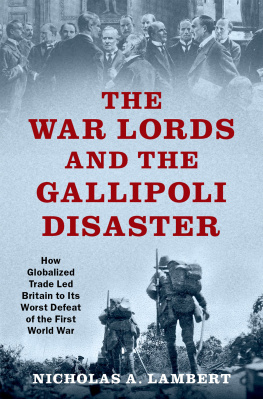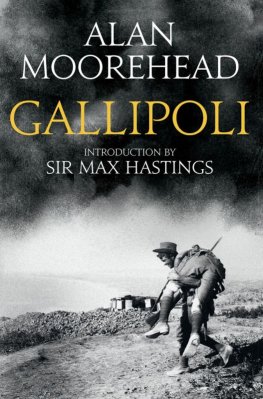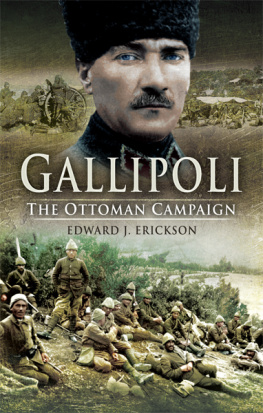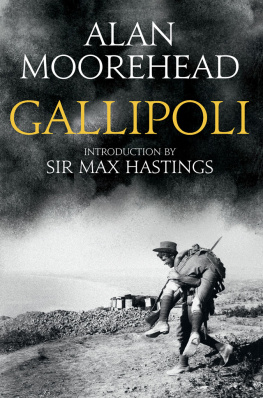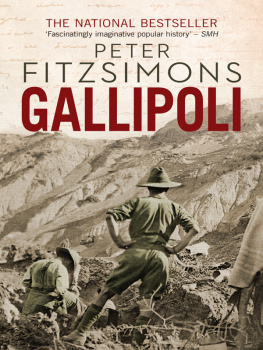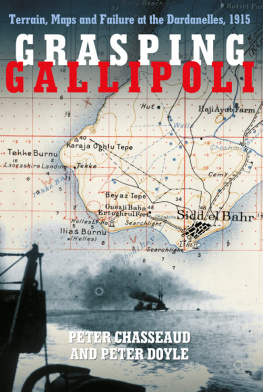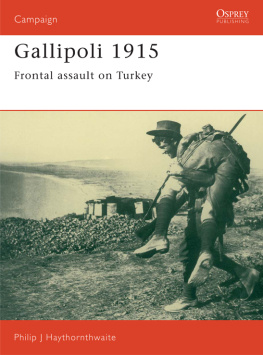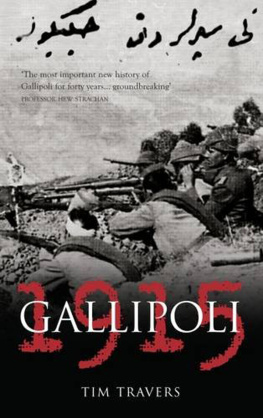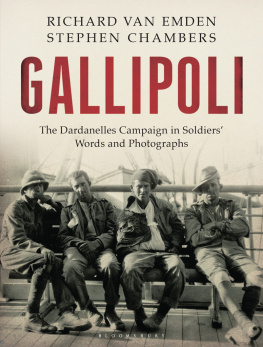The War Lords and the Gallipoli Disaster
OXFORD STUDIES IN INTERNATIONAL HISTORY
James J. Sheehan, series advisor
THE WILSONIAN MOMENT
Self-Determination and the International Origins of Anticolonial Nationalism
Erez Manela
IN WARS WAKE
Europes Displaced Persons in the Postwar Order
Gerard Daniel Cohen
GROUNDS OF JUDGMENT
Extraterritoriality and Imperial Power in Nineteenth-Century China and Japan
Pr Kristoffer Cassel
THE ACADIAN DIASPORA
An Eighteenth-Century History
Christopher Hodson
GORDIAN KNOT
Apartheid and the Unmaking of the Liberal World Order
Ryan Irwin
THE GLOBAL OFFENSIVE
The United States, the Palestine Liberation Organization, and the Making of the Post-Cold War Order
Paul Thomas Chamberlin
MECCA OF REVOLUTION
Algeria, Decolonization, and the Third World Order
Jeffrey James Byrne
SHARING THE BURDEN
The Armenian Question, Humanitarian Intervention, and Anglo-American Visions of Global Order
Charlie Laderman
THE WAR LORDS AND THE GALLIPOLI DISASTER
How Globalized Trade Led Britain to Its Worst Defeat of the First World War
Nicholas A. Lambert

Oxford University Press is a department of the University of Oxford. It furthers the Universitys objective of excellence in research, scholarship, and education by publishing worldwide. Oxford is a registered trade mark of Oxford University Press in the UK and certain other countries.
Published in the United States of America by Oxford University Press
198 Madison Avenue, New York, NY 10016, United States of America.
Oxford University Press 2021
All rights reserved. No part of this publication may be reproduced, stored in a retrieval system, or transmitted, in any form or by any means, without the prior permission in writing of Oxford University Press, or as expressly permitted by law, by license, or under terms agreed with the appropriate reproduction rights organization. Inquiries concerning reproduction outside the scope of the above should be sent to the Rights Department, Oxford University Press, at the address above.
You must not circulate this work in any other form and you must impose this same condition on any acquirer.
Library of Congress Cataloging-in-Publication Data
Names: Lambert, Nicholas A., 1967 author.
Title: The war lords and the Gallipoli disaster: how globalized trade led
Britain to its worst defeat of the first world war/ Nicholas A. Lambert.
Other titles: How grain and globalization led to Gallipoli
Description: New York : Oxford University Press, 2021. |
Series: Oxford studies in International history series |
Includes bibliographical references and index.
Identifiers: LCCN 2020041222 (print) | LCCN 2020041223 (ebook) |
ISBN 9780197545201 (hardback) | ISBN 9780197545225 (epub) | ISBN 9780197545232
Subjects: LCSH: World War, 19141918CampaignsTurkeyGallipoli Peninsula. |
World War, 19141918Economic aspectsGreat Britain. |
World War, 1914-1918Food supplyGreat Britain. |
Wheat tradeGreat Britain. | Wheat tradeRussia. |
Great Britain. Dardanelles Commission.
Classification: LCC D568.3 .L36 2021 (print) | LCC D568.3 (ebook) |
DDC 940.4/26dc23
LC record available at https://lccn.loc.gov/2020041222
LC ebook record available at https://lccn.loc.gov/2020041223
DOI: 10.1093/oso/9780197545201.001.0001
For Mallee, with love
Contents
The origins of this book can be traced to 1986, when as an undergraduate at Oxford University I attended a seminar series conceived and led by Sir Michael Howard, the Regius Professor in Modern History (1980-1989). The course was titled British Strategic Planning and the Dardanelles campaigna.k.a. special subject 21. More than once that cold and wet Michaelmas term, when discussing the inception of the operation, Sir Michael remarked upon the anomalies and inconsistencies in the official historical record. Many years later I discovered that he had read Lord Hankeys uncensored memoirs: he had been the censor. The questions he raised in class haunted me for the next thirty yearsthe notion of haunting one of his disciples rather amused him! Michael read this book in manuscript though sadly did not get to see it in print.
Over the years I have incurred numerous debts for much assistance and many kindnesses. For scrutinizing draft chapters and making valuable criticisms and suggestions, I would like to thank Lewis von Chester (a fellow SS-21 veteran), Eric Clemons, Steve Deal, Katherine Epstein, Cameron Hazlehurst, Michael Howard, Andrew May, Daniel Rogers, Jon Sumida, and Bruce Taylor. Particular thanks are owed to the late Robert Bruce, 8th Lord Balfour of Burleigh, as well as Janet Morgan, Lady Balfour of Burleigh, for their recollections, encouragement, and friendship. Here too I would like to acknowledge the late Mr. Andrew Marshall for his wisdom and his support over so many years; it was a privilege to work for a truly great man. Posthumous thanks are due also to Keith Neilson, a close friend and colleague, who until his untimely death in April 2015 was the preeminent scholar of twentieth century British diplomatic history. It was Keith who (rightly) insisted that I must look closer at the Russian wartime finances. I have missed his pure enthusiasm for scholarship; this book would have been far better if he were still with us.
My thoughts on the pre-1914 economic history of the international grain trade found in chapters two and three were critiqued at a University of Pennsylvania Economic History seminar. For their comments and suggestions for improvements, I am grateful to Professors Mark Flandreau, Walter Licht, and Dan Raff. Thanks are also due to Professor William Philpott (another SS-21 veteran) for his judicious review of my last book, Planning Armageddon: British Economic Warfare and the First World War, in which I first aired my thoughts of a connection between wheat and the genesis of the Dardanelles Campaign. Only half-persuaded of my argument, he prompted me to reexamine my ideas and agree that more archival digging was necessary. For a swift and painless production process, and for not dwelling on my grammatical ignorances (sic), I am grateful to Jeremy Toynbee and his team at Newgen. Lastly, and especially, I thank Susan Ferber at Oxford University Press the fastest editor north, south, east, AND west of the Pecos.
The following have graciously allowed me permission to quote from the material to which they own the copyright: the curators of the Bodleian Library (collections owned by the Bodleian Library); the Bonham Carter trustees (H.H. Asquith papers); Mrs. Anna Mathias (Venetia Stanley papers); the Harcourt family (Sir Lewis Harcourt papers); Garry Runciman and also the librarian, Robinson Library, Newcastle University (Runciman papers); Sir Charles Hobhouse (Charles E. Hobhouse papers); the Trustees of the National Library of Scotland (Lord Haldane papers); the Syndics of Cambridge University Library (Crewe Papers); Christopher Arnander (Reginald McKenna papers); the master, fellows, and scholars of Churchill College, Cambridge (Lord Hankey papers); the fifth Lord Esher (Lord Esher papers); the fourth Lord Fisher (Admiral of the Fleet Lord Fisher papers); the Trustees of the Baring Archive (Baring Brothers & Co. Papers); the Trustees of the British Library (Arthur James Balfour papers); the Trustees of the National Maritime Museum (Herbert Richmond papers); the master and fellows of Trinity College, Cambridge (Edwin Montagu papers); the Hon. Joanna Pease (Lord Gainford papers); Princeton University Library (John Grenfell Maxwell papers); the Corsham Estate (Field Marshal Lord Methuen papers). For permission to quote from the unpublished writings of J.M. Keynes, I thank the Provost and Scholars of Kings College, Cambridge; to quote from

